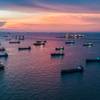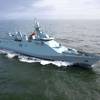Concordia has now exercised its option at Brodosplit Shipyard in Split,
Croatia, to order a further two Stena P-MAX product tankers at a
predetermined price.
This means that Concordia now has six vessels on order at the shipyard
for delivery in 2005-2006.
Superior economy, safety and environmental friendliness
The vessels, called Stena P-MAX, are conceptually similar to the two V-
MAX tankers utilised by Concordia to transport oil from West Africa to
Philadelphia since 2001, which provide the highest level of safety based
on double propulsion systems, rudders and steering gear. These vessels
have a 30 per cent larger cargo capacity and can call at ports with
draught restrictions, thus solving, by virtue of superior economy and
safety, problems transporting oil to ports, which would otherwise have
to be either dredged or closed down.
The six Stena P-MAX tankers can be used to solve some of the serious
bottlenecks affecting oil transportation.
Russian oil exports limited by ice in the north and narrow passages in
the south
Russian oil exports are expected to continue to increase sharply in the
next few years and this is welcomed by nations in the West as an
important component of the country's economic and political development.
However, exports are limited by ice problems for about four months every
year outside Russian export ports in the Baltic Sea. Concordia's six P-
MAX tankers will be built to Swedish/Finnish ice class 1B
specifications, which will enable them to operate in up to 80 cm thick
broken ice, prepared by icebreakers.
A large proportion of Russia's oil exports comes from the Black Sea and
is transported through the narrow and difficult-to-navigate Bosphorus.
Turkey has introduced restrictions on navigation, which means that
vessels with a length of more than 200 metres may only pass through the
Bosphorus during daytime. As a result, tankers have to wait several
weeks to pass through the Bosphorus, which in practice, means that Black
Sea oil is economically less advantageous for Russia and the large oil
companies, which have invested billions of dollars in the region.
The Stena P-MAX tankers will contribute to solving this transport
problem. With their length of 182.9 metres, they are free to sail
through the Bosphorus without having to wait for lengthy periods. But,
more importantly, these vessels, with their built-in safety systems and
double propulsion systems, represent a solution to the demands
authorities are expected to place on oil transportation in narrow waters
in the future.
The Stena P-MAX tankers have double propulsion systems and can operate
safely even if one engine room or its systems should fail. In addition,
the vessels have double rudders and double propellers, which give them
superior manoeuvrability. This translates into greater safety in heavily
trafficked waters with strong currents such as the Bosphorus.
Furthermore, Stena's concept for safe navigation of passenger ferries
has also been utilised in the new tankers, i.e. redundant systems, the
latest technology and bridge design. The vessels' ability to navigate
even if suffering from engine problems has been confirmed by Det Norske
Veritas' RPS classification - Redundant Propulsion Separate.
Oil exports from Russia and the vessels transporting the oil are
strictly monitored by environmental organisations and European nations
following several accidents involving tankers, which have resulted in
large-scale damage and negative publicity. This makes the P-MAX tankers
attractive alternatives.
Rising US gasoline imports but draught-restricted ports
Another anticipated bottleneck in tanker shipping is the rising imports
of light petroleum products to the US as a consequence of refinery
capacity not increasing at the same rate as rising demand. Although a
large proportion of these imports will be shipped from Asia, there is a
surplus of gasoline in Europe where cars and trucks, etc. often run on
diesel fuel. With increasing volumes of gasoline being transported from
Europe to US East Coast ports, the Stena P-MAX tankers are the perfect
answer. Our vessels not only have a very large cubic capacity, which is
needed for gasoline, but they are also dimensioned for the US ports and
can lift maximum cargoes for the US market. Naturally, their high safety
level is also an important argument in both Europe and the US.
Concordia's safe fleet: Six P-MAX and two V-MAX tankers
With this order, Concordia has completed its planned investments for the
time being. In a short period of time, Concordia's fleet has changed
from consisting of eight of the world's very safest and most well-
designed large tankers built in the 1970s to consisting of eight of the
world's safest and most economical tankers designed and built for the
21st century.
We will now concentrate on expanding our collaboration with the oil
companies looking for efficient and safe oil transportation where
Concordia's tankers can contribute to realising this goal.
Concordia's Chairman of the Board and CEO of Stena, Dan Sten Olsson,
says: "With these investments in Concordia's fleet, together with
Stena's own investments in the StenTex system, we have a tanker fleet of
16 ultramodern vessels under construction, which corresponds to an
investment of more than SEK 4.5 billion. None of these vessels is being
built on pure speculation - they are all earmarked for transport systems
where they can enhance both transport economy and safety. This is our
contribution to safe and secure flows of oil, which are a prerequisite
of stability and economic growth. The vessels will also be a safety
factor for Sweden, whose coasts are passed by all the tankers loading
oil in the Russian part of the Baltic Sea".
Lars Carlsson, President of Concordia, says: "Concordia has been
developing a system of safe tankers for more than 15 years with highly
competent and well-trained seafarers and a collaboration with leading
oil companies. The MAX tankers are a logical development for Concordia
and we will devote all our energy, together with the shipyard, to
refining their performance and training the crews that will man the
world's safest vessels".
Sponsored Content
Innovative Hull Maintenance: Profitable & Green

Subscribe for
Maritime Reporter E-News
Maritime Reporter E-News is the maritime industry's largest circulation and most authoritative ENews Service, delivered to your Email five times per week












